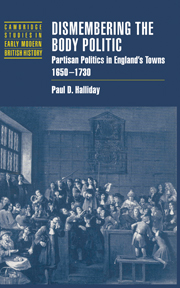Book contents
- Frontmatter
- Contents
- Preface
- List of abbreviations
- Part one Corporate ideal and partisan reality
- 1 The paradox of partisan politics
- 2 “The best of polities”
- 3 From purge to purge: Civil War, Interregnum, and Restoration in the corporations
- 4 Partisan politics, 1663–1682
- Part two The King and his corporations, 1660–1688
- Part three Partisan conflict and the law in a dynamic society
- Appendix A Royal charters of incorporation, 1660–1727
- Appendix B Enforcement of the Corporation Act, 1662–1663
- Select bibliography
- Index
- Titles in the series
2 - “The best of polities”
Published online by Cambridge University Press: 10 November 2009
- Frontmatter
- Contents
- Preface
- List of abbreviations
- Part one Corporate ideal and partisan reality
- 1 The paradox of partisan politics
- 2 “The best of polities”
- 3 From purge to purge: Civil War, Interregnum, and Restoration in the corporations
- 4 Partisan politics, 1663–1682
- Part two The King and his corporations, 1660–1688
- Part three Partisan conflict and the law in a dynamic society
- Appendix A Royal charters of incorporation, 1660–1727
- Appendix B Enforcement of the Corporation Act, 1662–1663
- Select bibliography
- Index
- Titles in the series
Summary
“Charles the Second, by the grace of God King of England, Scotland, France, and Ireland, Defender of the Faith … ”: the overture trumpeted the name and titles of the author of Kingston upon Hull's charter. The initial bore the King's portrait, with birds flitting and flowers bowing round about him, set off with the royal arms, all encircled by the garter. Engrossing the whole required a half-dozen parchment skins, from the last of which hung the great seal of England. This was a striking piece of work.
For corporation members who understood Latin, royal graciousness resounded throughout their charter. For those who did not, Hull had lawyers enough to explain. Charles proclaimed that Hull would have “of our special grace and of our certain knowledge and mere motion … one body corporate and politic, in thing, fact, and name.” By a wave of his hand, the King created a being alive in law if not in flesh. Lawyers imputed moral and theological, as well as legal and political, meaning to corporateness: “The best of polities is that invention whereby men have been framed into corporations … Although art cannot altogether arrive at the perfection of Nature, yet has it in this showed a fair adumbration, and given to man the nearest resemblance of his maker, that is, to be in a sort immortal.” Invoking God the singular rather than God tripartite, the leap from deity to corporation was a short one.
- Type
- Chapter
- Information
- Dismembering the Body PoliticPartisan Politics in England's Towns, 1650–1730, pp. 29 - 55Publisher: Cambridge University PressPrint publication year: 1998



